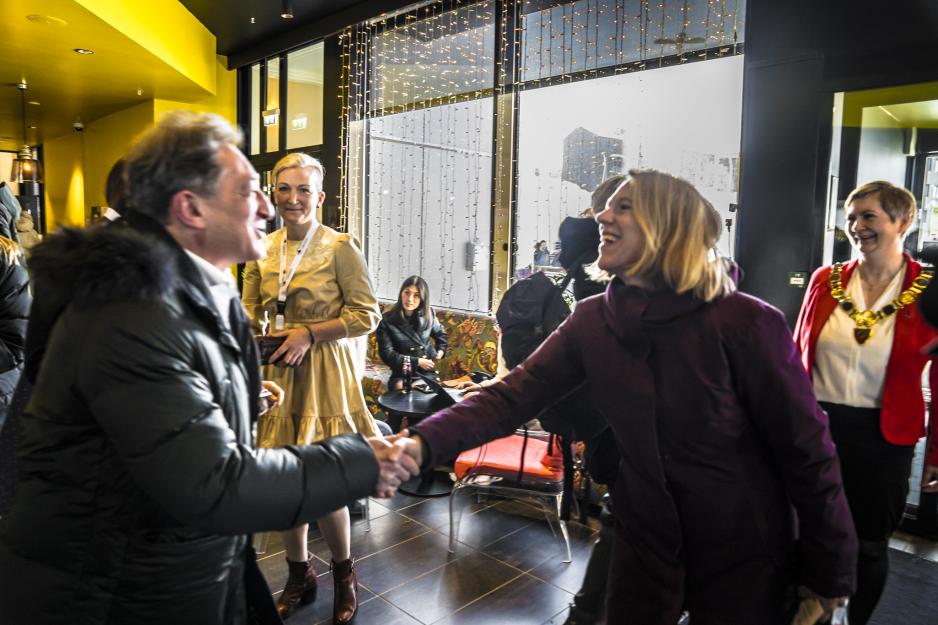Newsletter: No War in the Arctic

Russia's ambassador to Norway, Teimuraz O. Ramishvili, and Foreign Minister Anniken Huitfeldt (Labor Party) quickly greet each other at Kirkenesknferansen 2022 before the debate. (Photo: Jonas Karlsbakk/Barents Secretariat)
Dear reader; Russia’s invasion of Ukraine happens far away from the Arctic, yet the pressure from the bombs nevertheless reaches all the way to the people who live in the North. We have spent this week trying to find answers to what this will mean to the High North.
On Wednesday, we went to Kirkenes in Northern Norway, a small town near the Russian border, to attend the Kirkenes Conference. After two years of pandemic, the Arctic community was to meet for debate, social interaction and important meetings.
We were also to have the difficult conversations in the wake of Russia’s threats against Ukraine, and to cover the meeting between the Norwegian foreign minister and the Russian ambassador.
But then the world abruptly changed and the border town of Kirkenes woke to the news about Russia’s invasion of Ukraine Thursday morning.
The difficult conversations became nearly impossible. The planned news stream was put on hold in order to get our readers solid and correct information about what consequences the invasion will have for the High North.
We all were – and are – marked by the events.
In his Friday commentary this week, our Editor-in-Chief Arne O. Holm describes the two last days as surreal:
“For 24 hours Russians, Norwegians and Finns had promoted diplomacy and dialogue on the border between Russia and Norway. We went to bed Wednesday night hoping that war would be avoidable. The very next day, we woke to a bomb shower in Europe.”
Day two of the conference nevertheless went ahead as scheduled, though it was opened by a clearly affected Mayor of Sør-Varanger municipality who clearly condemned the Russian aggression.
But not the Russian people.
“The Russian people are our neighbors, our family, our friends and colleagues”, says Sør-Varanger Mayor Lena Norum Bergeng (Labor).
The question we at HNN and most others have asked ourselves is nevertheless whether the ongoing Russian invasion in Ukraine can become dangerous for Northern Norway?
The answer is both yes and no.
But there will not be war, argues a panel of experts who took on the difficult conversation during a debate on Thursday.
However,
“Russia decides the relationship to Norway”, says History Professor Kari Aga Myklebost.
And even if the war does not reach the High North, we will nevertheless notice increased tensions.
Professor Katarzyna Zysk at the Norwegian Institute for Defense Studies says to High North News that a potential escalation may end in Russia taking control over parts of the Barents Sea because protection of its strategic nuclear submarines is amongst the country’s top priorities.
The day before the war was a fact, the Russian Ambassador to Norway met the Norwegian Foreign Minister as they were giving their respective speeches. The message was unanimous:
The good cross-border cooperation and dialogue between Norway and Russia should continue despite the tense security policy situation.
Another consequence of the war is that participating in Arctic Council meetings can become more difficult, as Russia currently holds the chair and meetings may take place in Russia. Researchers nevertheless believe cooperation with Russia through the Council will continue.
All is not just war and misery this week.
At the Kirkenes Conference, Barents Games received the Thorvald Stoltenberg Award for its work to create attractive communities for youth in the High North.
One day, these young people will take over the world.
That gives us hope.
Kind regards,
Trine Jonassen,
News Editor, High North News

